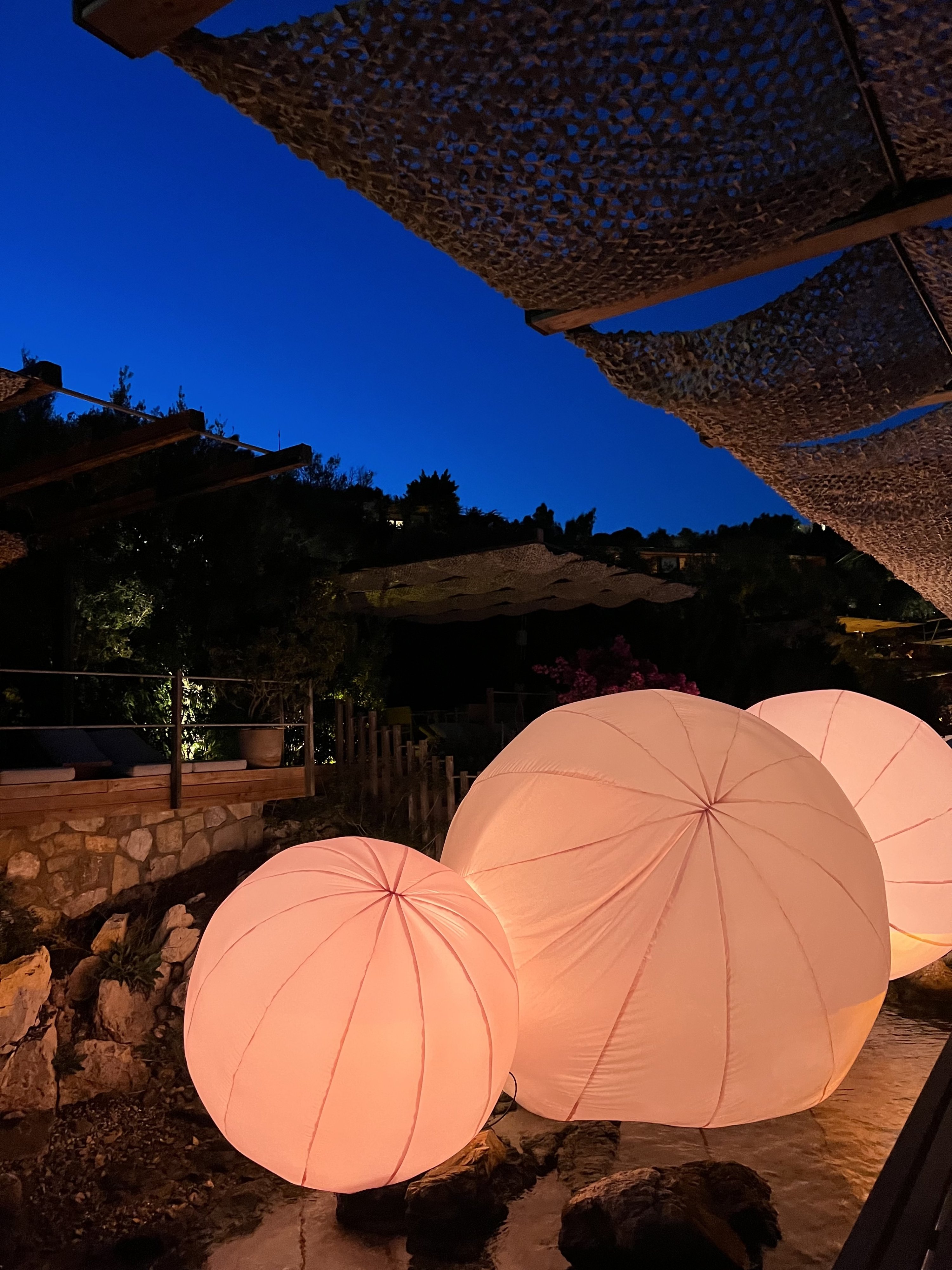© Turkuvaz Haberleşme ve Yayıncılık 2025
Maçakızı, a charming hillside hotel overlooking Türkbükü Bay in Turkey's resort town of Bodrum, is hosting a new exhibition titled "Between Humankind and Nature," featuring paintings, sculptures, design and site-specific installations by celebrated contemporary artists exploring humanity's relationship with nature and the world.
The group exhibition, which is organized by Istanbul-based independent platform ISTANBUL’74, displays works that Turkish and foreign artists have specially designed using local techniques and natural materials in collaboration with regional workshops and studios. Inspired by the striking landscape of the Aegean Riviera in Turkey, the works create a symbiotic harmony in the natural environment of Bodrum.
Curated by Demet Müftüoğlu-Eşeli, "Between Humankind and Nature" points to a new exploration area blended with the ancient and cultural texture of the Aegean region for creativity and artistic collaborations. Bringing together the works of Turkish and foreign artists who represent the diversity of interdisciplinary practices, it captures the essence of the artists' creative experiments and combines the nature of human beings with optical illusions.
Among the artists of the exhibition are Swiss contemporary artist Federica Perazzoli, Argentine industrial designer and artist Cristian Mohaded, Dutch-New Zealand designer and artist Sabine Marcelis, British installation artist Steve Messam, Cuban-American artists Jose Parla and Rey Parla , American textile artist and sculptor Rachel Hayes, tapestry art pioneer Belkıs Balpınar, Turkish contemporary artist Mehmet Ali Uysal, American conceptual artist Mike Berg, contemporary artist Carlito Dalceggio, known for his charcoal sketches, and interdisciplinary artist Koray Tokdemir, focusing on psychogeography, theoretical physics and neuroscience.
"Between Humankind and Nature" offers visitors an opportunity to see the depth and breadth of each artist’s practice in a new light. "After the pandemic, I felt the importance of our relationship with nature more deeply and wanted to explore it further with an exhibition presented in dialogue with the distinctive landscape of the Aegean Riviera," said Müftüoğlu-Eşeli, the exhibition’s curator and also co-founder of ISTANBUL’74. "I wanted to bring together artists from different backgrounds and disciplines as every creative practice adds a new perspective on the theme," she continued.
In the exhibition, one of the standouts is Mohaded’s "Waving Towers," featuring large-scale columns made of handwoven rattan shapes paying tribute to local weaving techniques. The artist, who focuses on objects with an innate simplicity and sensitivity and combines natural materials with geometry, produced "Waving Towers" during the exhibition’s artist residency program in collaboration with local weavers. The pieces of his installation sway gently and whistle in the winds of Bodrum. Their natural color and organic forms blend harmoniously with the surrounding vegetation and rocks on which they perch.
"We used a more elastic material than I would normally work with, which allowed us to experiment with new undulating forms," the Argentinian artist and designer Mohaded, who made a name for himself by fusing tradition, craft and technique with modern innovation and design, said. "It was a truly collaborative process that started with the exchange of know-how and ideas."
Equally eye-catching another work is "Jetty," a new site-specific installation by British artist Messam. Installed in the rocky shallows between the mainland and Maçakızı’s canopied wooden decking, it comprises a series of dusky pink inflatables that are impossible to ignore from far beyond. Some are squeezed into rocky crevices, while others bob in the waves and the wind.
"I hope visitors will look at how they move and transform this stretch of water," Messam, who is best known for his ephemeral site-specific works that interrupt the landscape, noted. "If people slow down, ask questions and look at the space in a new way, even for just a moment, then I’ve done my job," he added.

The inflatables, produced in collaboration with a tailor in Bodrum, are made from lightweight polyester with a waterproof coating – a first for Messam, who usually works with ripstop nylon. "If you look closely, you’ll see the ripples and imperfections in the fabric. Unlike my other works, 'Jetty' has a soft, material quality to it. And I like that," he informed.
Then when it comes to the unusual pastel pink coloring of "Jetty," Messam explained: "Ripstop nylons usually come in primary or saturated colors, and I wanted 'Jetty' to speak the language of this landscape. The Aegean hills have a dusty color to them, the sea is a turquoise-green, and the sky is a very pale blue. It was important for me to work with this natural palette and respect the light and the view."
When visitors wander up the pine-clad hill, the most attention-grabbing piece is surely Uysal’s paper boat, which is situated near a pool as if it is about to set sail. The piece was conceived for this exhibition in collaboration with a local metal workshop.
Fabric installations from Hayes’ checkers series float in the breeze as well. Hung above one of Maçakızı's outdoor terraces, the multicolored pieces provide a different view with each gust of wind, which makes visitors watch and scrutinize them and think about human beings' connection with their surroundings.
"Between Humankind and Nature" will run until Sept. 10 at Bodrum's Maçakızı.
